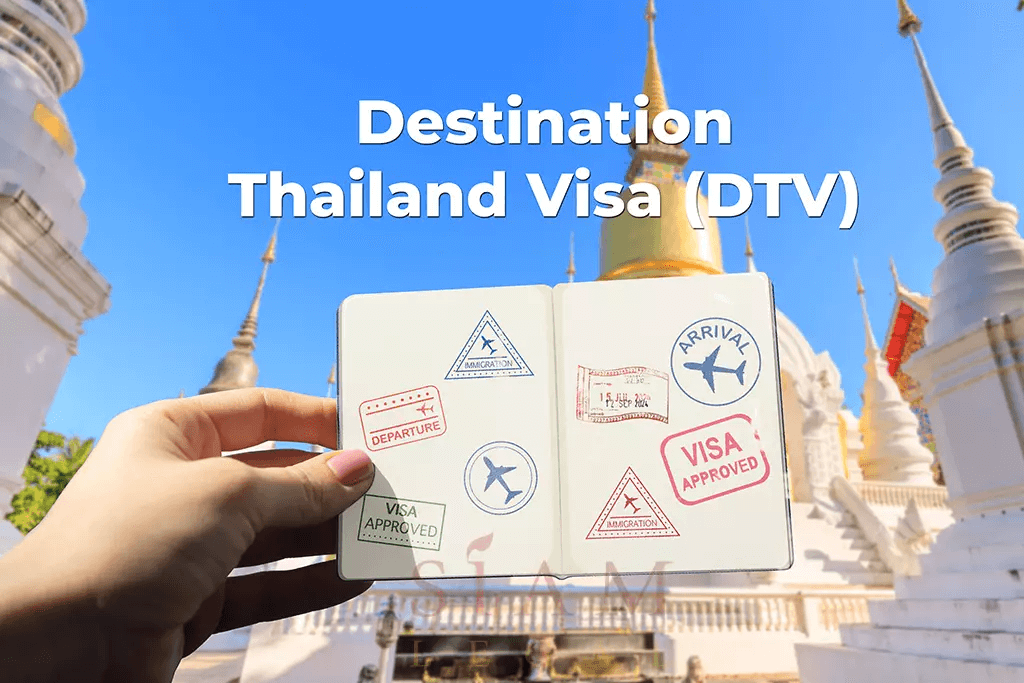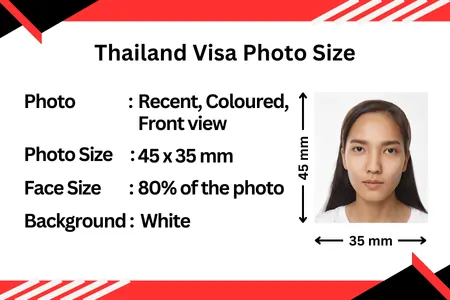Thailand has long been a popular destination for tourism and long-term residency. If you’re planning an extended stay to explore its attractive landscapes and leisure life, the destination Thailand visa (DTV) will be a good choice. In this guide, we’ll break down everything you need to know about the visa and help you get fully prepared for the Thai adventure, including destination Thailand visa requirements, eligibility, benefits, application process, fees, and processing time.
What Is Destination Thailand Visa (DTV)?
The destination Thailand visa (DTV) is a long-term Thai visa introduced in 2024. It aims to attract remote workers, freelancers, and tourists. Unlike traditional tourist visas, the DTV allows foreigners to stay in Thailand for up to 180 days per entry and extend the stay for another 180 days (360 days in total). Valid for 5 years and allowing multiple entries, the DTV is ideal for those who are seeking extended stays in Thailand and travel frequently between Thailand and their home country.

Benefits of Applying for a Destination Thailand Visa
Compared with other Thai visas, the DTV holders can enjoy some distinctive benefits, including:
- Long-Term Flexibility
You can stay for up to 360 days (180-day regular stay plus 180-day extended stay). During this period, you don’t need to leave for visa renewal and re-enter the country. With a 5-year validity, it saves the trouble of frequent renewal.
- Multiple Entries
You can travel in and outside Thailand multiple times as long as the visa remains valid. Moreover, it is more cost-effective than other multiple-entry Thai visas like elite visas or retirement visas.
- No Immigration Constraints
The DTV is available to all adults over 20 years old. You can also bring your spouse and children under 20 to live with you in Thailand as long as you can provide the extra required proof.
- Cultural Immersion
You can legally participate in Thai “soft power” activities, such as Muay Thai training or culinary courses.
- Remote Work
You can work remotely for companies outside Thailand. Please note that if you want to work for a company based in Thailand, a regular work permit is required.
Who Can Apply for a Destination Thailand Visa?
Due to its long validity and extraordinary benefits, the visa caters to three main groups aged at least 20 years old, including:
- Remote workers and freelancers
They can be digital nomads, remote workers, foreign talent, and freelancers. Applicants must earn money from employers or clients outside Thailand.
- Cultural & Medical Tourists
They refer to participants in Thailand’s soft power-related activities, such as Muay Thai, cooking classes, yoga, meditation, medical treatments, cosmetic surgery, etc.
- High-Skilled Professionals
Experts in tech, finance, or other professional fields are eligible for a Thailand destination visa. They are expected to contribute to Thailand’s economy
Destination Thailand Visa Requirements 2025
To apply for the DTV, applicants must submit a set of required documents to prove their identity and the purpose of the visit. Here are the general requirements.
- Passport
It must be valid for at least 6 months upon the date of traveling and have at least 2 blank pages.
- Passport-style photograph
It must be taken recently and satisfy the official Thai visa photo requirements.

- Proof of current location
It can be a driving license, bank statement, or residence permit.
- Financial Proof
There must be a balance of at least 500,000 THB or (approx. 14,863 USD). Documents like a recent savings receipt, checking bank statement, or payslip are acceptable. The document must show the name of the applicant and the date. If you submit a family bank statement, proof of relationship, for example, a birth certificate or marriage certificate, is also required.
- Purpose-Specific Document
- It is subject to the purpose of traveling to Thailand.
- Workcation: Employment contract or employment letter to prove the remote work eligibility or freelancer status.
- Thai soft power-related activities: Enrollment letter from accredited institutions.
- Medical treatment: letter of appointment or treatment plans from a certified hospital or medical center.
- Family applications: DTV visa of the primary DTV holder as well as proof of relationship to the DTV visa holder (e.g. birth certificate, marriage certificate, adoption certificate, etc.).
How to Apply for a Destination Thailand Visa 2025
There are several methods to apply for a DTV, including online applications, in-person applications, or applications through visa agencies. No matter which one you choose, you have to go through the following procedures.
Choose Your Application Method
The Thailand government has launched an e-Visa system aiming to simplify the application procedures and reduce waiting time. You just need to create an account on Thailand’s official e-visa portal and submit the application online. If you are not eligible for online applications, you can apply in person at a nearby Thai embassy or consulate. If you want a more hassle-free method, you can turn to a visa agency.
Complete the Application
Fill out an application form online or at the visa office which gathers personal details, travel history, and purpose of stay honestly. Make sure you have provided all required information accurately.
Upload Documents
Upload the required documents online or mail them to a designated visa office. If you submit scanned copies, please ensure they are clear, legible, and intact.
Pay the Visa Fee
It generally costs 10,000 THB to apply for a DTV and there might be extra fees according to the service and application methods you choose. The visa fee can be paid by credit/debit cards or mobile payments.
Track and Receive Approval
After submitting your application, you should wait patiently for the results. You can check the case status on the official e-Visa system or by contacting the visa officer or agent. If the authority requires extra documents or action, you must respond promptly.
Where to Apply for Da estination Thailand Visa?
If you intend to apply in person, you can visit a nearby Thai embassy or consulate. Here is a list of the consular offices in the United States.
| Consular Office | Address | Contact | States in Jurisdiction |
| Royal Thai Embassy, Washington D.C. | 1024 Wisconsin Ave NW, Suite 401, Washington, D.C. 20007 | Phone: +1 (202) 944-3600 Email: thaiembdc@thaiembdc.org | Washington D.C., Delaware, Kentucky, Maryland, Ohio, Pennsylvania, Virginia, West Virginia |
| Royal Thai Consulate General, New York | 351 E 52nd St, New York, NY 10022 | Phone: +1 (212) 754-1770 Email: thainy@thaiembassy.org | Connecticut, Maine, Massachusetts, New Hampshire, New Jersey, New York, Rhode Island, Vermont |
| Royal Thai Consulate General, Los Angeles | 611 N Larchmont Blvd, Los Angeles, CA 90004 | Phone: +1 (323) 962-9574 Email: thai-la@thai-la.org | Southern California, Arizona, Colorado, Nevada, New Mexico |
| Royal Thai Consulate General, Chicago | 700 N Rush St, Chicago, IL 60611 | Phone: +1 (312) 664-3129 Email: thai.chicago@thaiembassy.org | Illinois, Indiana, Iowa, Michigan, Minnesota, Missouri, Wisconsin |
| Royal Thai Honorary Consulate, Miami | 1520 NW 79th Ave, Miami, FL 33126 | Phone: +1 (305) 397-1414 Email: thai.miami@thaiembassy.org | Florida, Georgia, Puerto Rico |
Destination Thailand Visa Fee & Processing Time
The DTV first-time application fee costs 10,000 THB (approx. 290 USD) while the extension fee costs 1,900 THB (approx. 56 USD).
The regular processing time usually takes 3–5 weeks, but it might vary in peak or off seasons, where you apply from, and whether you have provided sufficient evidence. If you are in an urgent need to travel, you can pay extra fees for expedited processing which may reduce this to 10 business days.
Destination Thailand Visa Validity & Stay Duration
The destination Thailand visa is valid for 5 years upon the date of issuing. During this period, visa holders can re-enter multiple times and stay for up to 180 days per entry. If you want to stay longer, just request an extension for another 180 days from within Thailand. However, if your visa expires after 5 years, you have to leave Thailand and re-apply it from your home country or country of residence. It is necessary to note that overstay is not permitted, otherwise, there will be severe penalties, such as fines of 500 THB per day, deportation, or future entry rejection.
FAQ
What is the minimum income for the DTV?
You must show proof of 500,000 THB (about 14,863 USD) in savings or income.
Can I extend the DTV?
Yes. You can extend it once at a Thai immigration office and stay for another 180 days. Click here to learn how to extend a visa in Thailand.
Can I work in Thailand with a DTV?
Yes, but only remote work for foreign employers. If you work for a local employer, get a work visa first.
Is there an age limit?
Applicants must be 20 or older.
What if I overstay my DTV?
You will be fined 500 THB per day and a maximum of 20,000 THB. If you overstay for longer than 90 days, you might be deported and banned from re-entering the country for a certain period.
Conclusion
The Destination Thailand Visa DTV is suitable for digital nomads, culture enthusiasts, or medical tourists due to its long-term flexibility, affordability, and ease of access. This passage can help you check your eligibility and make full preparations to apply for it. We hope you can get the visa successfully and start a wonderful journey to explore this beautiful country.